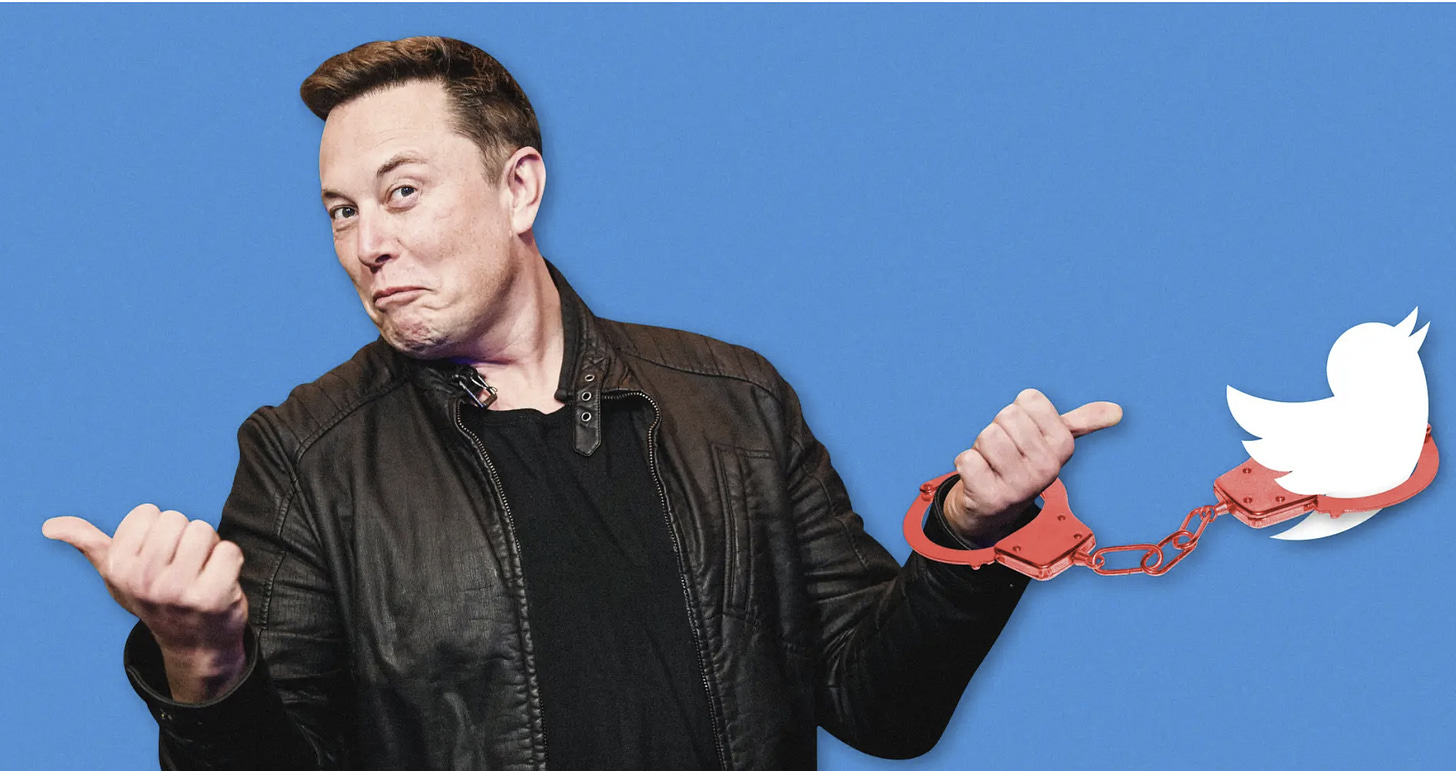Finally, Hopeful News For Twitter Bondholders: Court Grants Fast-track Trial Against Elon
Elon had demanded 2-3x more time to support his dubious claims of securities fraud against Twitter than he took to commit securities fraud by secretly buying the stock to force a hasty hostile buyout.
The best hope for Twitter ( TWTR 0.00%↑) bondholders in the whole Twitter versus Elon mess is completion of the sale of the floundering company to Elon Musk so they can get out with the change of control put at 101% of par (see Twitter: Take the Money And Run, 4/26/22).
After months of limbo, Delaware Chancery Court took this outcome a definitive step further yesterday when it granted Twitter’s petition to fast-track its lawsuit aiming to compel Elon to buy the company as agreed.
Twitter filed its complaint after Elon Musk notified the board he was terminating the deal, accusing the company of lying about its bot problem in public filings and statements—securities fraud. Not only does the acquisition agreement make no provision for him to arbitrarily bolt like this, he still fails to offer a shred of evidence to support his incendiary claims despite complaining loudly and very publicly for months.
Perhaps this is why he told the Court he needed a substantial delay until at least February to make (manufacture) his case. Eight months.
He took only a week to break his (shotgun wedding) agreement to join Twitter’s board, just after he finally revealed his 9.2% stake which he has secretly acquired over three to four months. His failure to report this material position and his intentions has triggered investigations by the SEC and FTC.
Two days later he made his hostile bid to buy the company and take it private. He pushed his bloated $44 billion price as his “best and final offer” after apparently scant (if any research) and waiving due diligence to sweeten the deal (see Elon Buying Twitter? Probably Not, 4/14/22).
That price proved to be so high versus Twitter’s floundering market value that the board finally accepted it would be derelict if it didn’t agree to sell—even to Elon Musk, the only bidder. So, just one week after Elon decided to blow $44 billion on Twitter, following scant effort and even less analysis, he had his deal (see Twitter: Take the Money And Run, 4/26/22).
Elon still had the gall to accuse Twitter in court of moving at warp speed for seeking an expedited trial date in September—to compel him to close the deal as agreed in October.
Few who know anything about Elon’s history should be surprised. I wrote in early June, “Anyone paying any attention to Elon Musk over the years knows he tends to disregard his obligations when he finds them inconvenient. He may not even honor what he just said yesterday.”
But when he doesn’t get his way, like getting released from his self-inflicted agreement he can’t afford to buy Twitter, “He gets angry, and nasty, and vulgar, and vindictive, and ruthless.”
But his typical high jinks are not working for him this time. As I noted:
Elon Bullied His Way Into A Trap
Elon certainly knew about Twitter’s spam bots long before he tried to buy the company. He even cited fixing the spam bots as a key reason he wanted to buy Twitter—while also waving off any effort at due diligence that he could have done if he actually was worried about Twitter’s publicly disclosed assessment of the problem.
But now, just weeks later—and now that he is struggling to get other investors on board—Elon has decided to accuse Twitter of lying about the gravity of its spam bot problem in SEC filings. Elon claims Twitter’s failure now to prove otherwise as he suddenly demands has breached his agreement to buy the company.
This is rich since, again, Elon himself decided he didn’t want to do any due diligence and so was, effectively, buying the company as is.
Plus the SEC and the FTC are now investigating Elon because he failed to report within legal time limits that he was accumulating his 9.2% Twitter stake with intentions to buy the company—a move that may have netted him a $156 million windfall since he was able to buy the stock at cheaper prices before he announced the news.
Few believe Elon has suddenly become so upset over Twitter’s spam bots. More likely he’s just grasping at anything—even lying—to get out of the mess he has made.
Elon's Trying To Get Out Of Buying Twitter—As We Knew He Would, 6/7/22
Twitter elaborated on these concerns in its 60-page lawsuit filing with the Delaware Chancery Court, as well as the consequences:
In April 2022, Elon Musk entered into a binding merger agreement with Twitter, promising to use his best efforts to get the deal done. Now, less than three months later, Musk refuses to honor his obligations to Twitter and its stockholders because the deal he signed no longer serves his personal interests. Having mounted a public spectacle to put Twitter in play, and having proposed and then signed a seller-friendly merger agreement, Musk apparently believes that he — unlike every other party subject to Delaware contract law — is free to change his mind, trash the company, disrupt its operations, destroy stockholder value, and walk away.
Twitter called Musk’s complaints about bots an “irrelevant sideshow.” The company detailed how Musk actually showed little interest in learning more about Twitter’s platform monitoring and cleansing of bots. Indeed, the buyout agreement didn’t even mention bots, or any inordinate concerns. Musk failed to turn up at scheduled meetings set for his behalf by Twitter management and even admitted he hadn’t read mountains of data Twitter provided as far back as May to meet his demands. Instead, he seemed more interested in escalating his requests to such absurd levels of complexity and intrusion that Twitter would refuse at some point and give him the breach he was trying to manufacture to kill the deal.
Twitter concluded that Elon wanted out of the deal when Tesla TSLA 0.00%↑ stock started plummeting. “The value of Musk’s stake in Tesla, the anchor of his personal wealth, has declined by more than $100 billion from its November 2021 peak.” This spiked the number of Tesla shares Musk would have to sell to fund his Twitter buyout, threatening his controlling stake in Tesla.
This view has long been speculated by many, including me:
Anyone paying any attention to Elon Musk over the years knows he tends to disregard his obligations when he finds them inconvenient. He may not even honor what he just said yesterday.
So it should surprise no one that Elon is trying to weasel out of his now comically overpriced and arrogantly ill-advised hostile bid for Twitter (TWTR).
I suspect he started working on his exit plan as soon as his buyer’s remorse kicked in, which apparently was right after he signed the contracts. I suspect that was the first time he realized his stupid, attention-seeking stunt could cost him serious money which he didn’t have and could have trouble cobbling together.
Elon's Trying To Get Out Of Buying Twitter—As We Knew He Would, 6/7/22
Elon’s dilemma no doubt was exacerbated, as I have speculated, by Musk’s increasing difficulty to attract outside investors to join in—mostly because of his own unhinged behavior (see Elon Gets a Boost From Friends For His Twitter Buyout—And Takes *Some* Of The Heat Off Himself, 5/5/22). “So Musk wants out,” Twitter said.
Nevertheless, as Twitter told the court, Musk is “contractually obligated to use his best efforts to close deal, instead, he is “doing the exact opposite.”
“He’s engaging in sabotage” and “has no intention of keeping any of his promises.”
Chancery Court Chief Judge Kathaleen St. J. McCormick rejected Elon’s excuses for dragging out the case into February of new year—eight months versus meer days and weeks Elon spent actually throwing his deal together.
McCormick said the case is “creating a cloud of uncertainty” that is inordinately damaging to Twitter. “The reality is, continued delays threaten imminent harm” to the company,” she said, “
More intriguing, McCormick observed that “monetary damages appear to be an insufficient remedy in this case” before ruling in favor of Twitter for a 5-day trial to be set in October.
This seems to suggest that the judge may already be inclined to accept that Twitter has been inordinately damaged by Musk and that the sale of the company should happen as agreed versus a negotiated settlement.
If so, this would the best possible outcome for Twitter’s wary bondholders, as I noted back in April (see Twitter: Take the Money And Run, 4/26/22).
A buyout of the company triggers an exit for bondholders to sell out via the change of control put at 101% of par (see Twitter: Take the Money And Run, 4/26/22). This is far superior to limping along indefinitely as the company struggles with dying revenue momentum and escalating costs, even before it started funding its massively expensive battle with Elon plus potentially related lawsuits from other stakeholders if it fails to prevail.
This outcome is far from certain at this point, but seems increasingly likely given the strength of Twitter’s case against Musk. In the meantime Twitter’s cash stash should be sufficient to maintain comfortable debt service through the end of the year until the outcome is decided.
And if the court rules that Elon will buy Twitter as agreed, new investors should absolutely avoid buying into the mountain of new bonds—up to $13 billion or so—the newly privately held company will sell need to offset Elon’s urgent need to sell Tesla stock to fund it. Twitter’s operations don’t support the debt it has now, much less the avalanche of acquisition debt to come.
Twitter’s existing $1.7 billion in senior notes are callable at 101% of par if the company is sold, but the new $1 billion issue of 5% notes due 2030 were down 2 points versus my last report at 95.9 (5.7% ytw). The $700 million 3.875% notes due 2027 have dipped 1 point to 94.7 (5% ytw). Another 4-5 points downside is possible, but now slightly improved prospects that the deal will be court-ordered to close before year end suggests better upside potential to 101 from current levels. (Definitely avoid buying new Twitter bonds offered to help fund the LBO if the company is sold.) Rate now “Outperform.”
Contact Us:
Disclaimer
This publication is prepared by Bond Angle LLC and is distributed solely to authorized recipients and clients of Bond Angle for their general use. In addition:
I/We have no position(s) in any of the securities referenced in this publication.
Views expressed in this publication accurately reflects my/our personal opinion(s) about the referenced securities and issuers and/or other subject matter as appropriate.
This publication does not contain and is not based on any non-public, material information.
To the best of my/our knowledge, the views expressed in this publication comply with applicable law in the country from which it is posted.
I/We have not been commissioned to write this publication or hold any specific opinion on the securities referenced therein.
Bond Angle does not do business with companies covered in its
publications, and nothing in this publication should be construed as a solicitation to buy or sell any security or product.Bond Angle accepts no liability whatsoever for any direct, indirect, consequential or other loss arising from any use of this publication and/or further communication in relation to this document.






